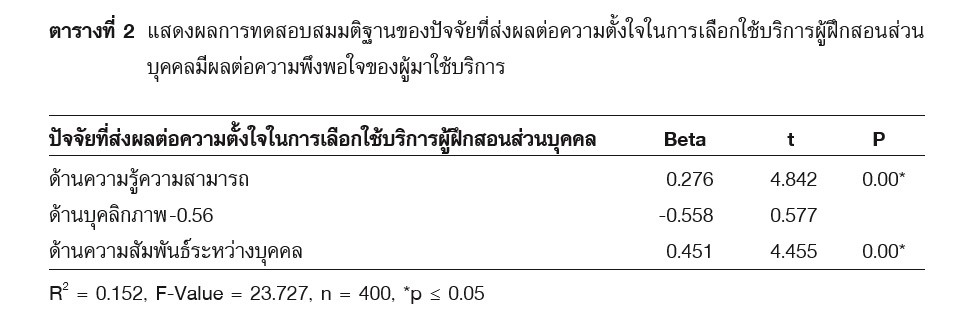FACTORS AFFECTING CONSUMERS’ INTENTION TO EMPLOY PERSONAL TRAINER SERVICES OF FITNESS CENTER IN BANGKOK METROPOLIS
Main Article Content
Abstract
Purpose : The purpose of this research aimed to study factors affecting consumers’ intention to employ personal trainer services of fitness center in Bangkok Metropolis. Specific purpose to the personal trainer factors are the factor of expertise, personality factors and interpersonal factors.
Methods : The samples include 400 customers who used personal trainer at fitness centers in Bangkok. Questionnaires were used as research instrument. The data were analyzed using descriptive statistics including frequency, mean, and standard deviation. Research hypothesis was tested by using multiple regression.
Results : The majority of respondents were female, 26-35 years old, worked in private companies, bachelor’s degree level. The result showed that the personal trainer’s expertise and the interpersonal relationships were likely to affect the willingness to choose a personal trainer. Whilst the personal trainer’s personality did not seem to affect the willingness to choose a personal trainer.
Conclusion : The factors affecting consumers’ intention to employ personal trainer services are the personal trainer’s expertise and the interpersonal relationship. This occur due to the personal trainer’s expertise both in practice and theory in health care aspects. Those help customers to achieve the goals and exercise safely and that is what customers need. For the interpersonal relationship, this is caused by care good human relations which include enthusiasm, and willingness to provide service. This is an important part to make customers feel impressed and would like to repurchase the service again.
Article Details
References
American College of Sport Medicine. (2011). Selecting and Effectively Using a Personal Trainer. Avaliable on https://www.acsm. org/docs/default-source/brochures/selectingand- effectively-using-a-personal-trainer.pdf
American Council on Exercise. (2013). How to Choose the Right Personal Trainer. Retrieved from https://www.acefitness.org/education-and-resources/lifestyle/blog/6624/how-to-choose-the-right-personal-trainer
Bangkokbiznews. (2016). Call Me Presonal Trainer. (Online). Retrieved December 19,2016, from https://www.bangkokbiznews. วารสารวิทยาศาสตร์การกีฬาและสุขภาพ ปีที่ 21 ฉบับที่ 1 (มกราคม-เมษายน 2563) 109 com/news/detail/732419
Brotherton, J., and Evans, C. (2010). The importance of the trainer: factors affecting the retention of clients in the training services sector. Industrial and Commercial Training, 42(1), 23-31.
Chaiyingyong, N. (2017). Health and Wellness Industry Trends. (Online). Retrieved January 2, 2017, from Bangkokbiznews Website: https://www.bangkokbiznews.com/news/detail/734269
Chiu, W.-Y., Lee, Y.-D., & Lin, T.-Y. (2011). Innovative services in fitness clubs:personal trainer competency needs analysis. International Journal of Organizational Innovation, 3(3), 317-328.
Frost, J. L. (2009). Characteristics Contributing to the Success of a Sports Coach. The Sport Journal 12(1).
Hutson, D. J. (2013). “Your body is your business card”: Bodily capital and health authority in the fitness industry. Social Science and Medicine, 90, 63-71. doi:https://doi.org/10.1016/j.socscimed.2013.05.003
Infofit. (2018). 10 Reasons to Hire a Personal Trainer. (Online). Retrieved February 20,2018, from https://www.infofit.ca/10-reasons-to-hire-a-personal-trainer/
Kittipongphakorn, K. and Tingsabhat, J. (2012). The opinions of managers and members of fitness centers about desirable characters of exercise leaders. Journal of Sports Science and Health, 13(1), 50-62.
Malek, M. H., Nalbone, D. P., Berger, D. E., and Coburn, J. W. (2002). Importance of health science education for personal fitness trainers. Journal of Strength and Conditioning Research, 16(1), 19-24.
Melton, D., Dail, T. K., Katula, J. A., and Mustian, K. M. (2011). Women’s perspectives of personal trainers: a qualitative study. The Sport Journal, 14(1), 1-18.
Melton, D. I., Dail, T. K., Katula, J. A., and Mustian, K. M. (2010). The current state of personal training: Managers’ perspectives. Journal of Strength and Conditioning Research, 24(11), 3173-3179.
Melton, D. I., Katula, J. A., and Mustian, K. M.(2008). The current state of personal training: An industry perspective of personal trainers in a small southeast community. Journal of Strength and conditioning research, 22(3), 883-889.
Mekthon, S. (2007). Personal trainer must have a license. (Online). Retrieved Junly 25,2007, from https://www.manager.co.th/QOL/ViewNews.aspx?NewsID=9500000087008
National Statistical Office of Thailand. (2015). Number of population aged 15 years and over by physical activity 2015. (Online).Retrieved April 6, 2018, from National Statistical Office of Thailand Website: https://service.nso.go.th/nso/nsopublish/themes/files/ExcPhysical_ActivityPdf58.pd
Olivo, J. (2018). Preferred Traits in Personal Trainers. Master’ Thesis, Kinesiology and Health Science, Stephen F. Austin State University .Texas.
Prachachat. (2011). Office of the Consumer Protection Committee on Complaints, Fitness Membership Agreement. (Online). Retrieved June 25, 2011, from https://www.prachachat.net/news_detail.php?newsid=
Prachapichai, S. (2017). Personal Trainer. (Online).Retrieved January 3, 2017, from https://roo- young.com/archives/407
Thongjinda, A. (2014). Willing to pay for a personal trainer. Master’ Thesis, School of Development Economics, National Institute of Development Administration .Bangkok. Sirisakkasemporn, S. (2015). Outside skills,
Knowledge and Personality Can Affect the Decision to Use a Personal Trainer in a Gym. Master’ Thesis, School of Business Administration, Bangkok University . Pathum Thani.


